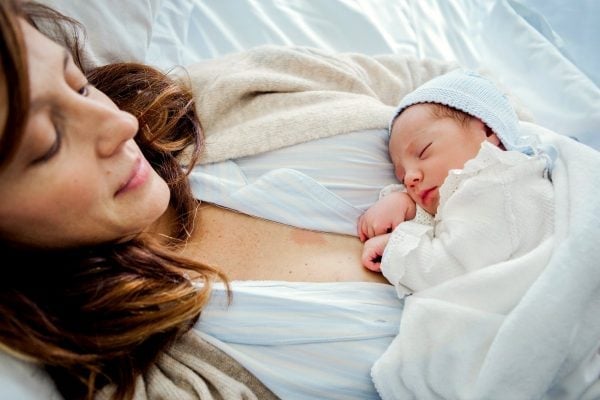
For a lot of Australians, when we hear the term “home birth”, we think of hippie types insisting on no medical intervention.
“The first question is, ‘Is that safe?’” says Hilary Rorison from the Australian College of Midwives. “The second question is, ‘Oh, can you do that?’”
Rorison says in some other countries, like the UK, home birth is “not such a big deal”.
“Home birth is part of their system. It’s more normalised.”
Mums and non-mums answer questions about childbirth with very telling results.
In Australia, only 0.3 per cent of women have a planned home birth. That’s around a tenth of the number that give birth at home in the UK.
There are a small number of publicly funded home birth programs operating from Australian hospitals, and women can also choose to give birth at home with private midwives.
So what’s like to have a midwife-led home birth in Australia?
Rorison, who is based in Adelaide, has spent four years as a home birth midwife.
“There’s something really special about women labouring at home that is quite difficult to bring into a hospital environment,” she tells Mamamia.


Top Comments
In our family - I birthed at home, with a privately practicing midwife in attendance, and had a smooth, uncomplicated birth of less than 4 hours which followed a smooth and uncomplicated pregnancy and a healthy baby boy. My sister in comparison, had fragmented care through the public hospital system, had an outwardly uncomplicated pregnancy, was ignored during labour even after she said she felt something was wrong and was sent home because she wasn't 'far enough along', ignored again by staff when she was re-admitted saying she didn't feel right (it was a slow night and the staff on duty were busy catching up on admin jobs) and it took my brother-in-law yelling in the corridor for someone to come... and discover the baby was in distress... and my nephew was born with an APGAR of 3 and will spend the rest of his life with CP.
Let's quit politicising place of birth and start looking really carefully at modes and models of care for women and their babies (and for the long term health and wellness of the family) and assess the safety and danger there.
It is easy to target homebirth to demonise and ignore the fact women and babies are damaged and traumatised in the hospital system. The fact that suicide is the number one mortality risk for post-partum woman in Australia tells us that there is something horribly wrong with the way birthing women are treated when they are at their most vulnerable.
J.C. - Brisbane
My concern is this - no matter how educated, well-informed the mother-to-be is & how well-set up the home-environment is and how prepared and capable the midwife is, there's always a crucial "unknown factor " in any home-birth.
The baby.
There will always be an element of risk with a home-birth that is unpredictable.
That 30 min or 5 minute delay in getting expert hospital intervention could risk the baby's life.
Both of my children would have fared very badly in a home-birth situation so even though my personal experience isn't enough to say no to a home-birth my point is -
both of those births were doing really well - until they didn't.
In 2019 there's no way I'd ever risk the baby's safety so that I could have a "special, comfy, relaxing experience".
It is not just the baby who is at risk, but potentially the mother as well. Women still (not very often) do in or just after giving birth.
This is why I can’t understand the comments around it being perfectly fine for straight forward births - yes, this is true, but you can’t predict what kind of birth it will be so how is this even relevant? I personally don’t understand how anyone can take such a risk when they don’t need to. There are options to join a midwife program or find a supportive OB if you want an intervention free birth, but still have the safety net of a hospital.
Well they can kind of tell how things are going- any early signs of trouble you go to hospital - no different then waiting for the obstetrician to arrive when called in.
It’s a judgment call people make and the risks are very very small so it’s best to let people make their choice without judgement.
If you 42 and birthing at home without a midwife then I think your mad and I will judge as the stakes are so much higher.
You can't predict everything, though. For instance, the best midwife in the world can't give an 100% guarantee that a catastrophic postpartum haemorrhage won't occur - and there's no way of predicting them all ahead of time. Sure, drugs can be initiated while you wait for the ambulance, but in those circumstances, literally every second counts, and there's only so much a midwife can do. I know I'd sooner be in the same building as an ICU, surgeons and operating theatre than have to wait for an ambulance to get me there. When we're called to a delivery suite MET (medical emergency team) call in the hospital, we literally run there - it's time-critical.